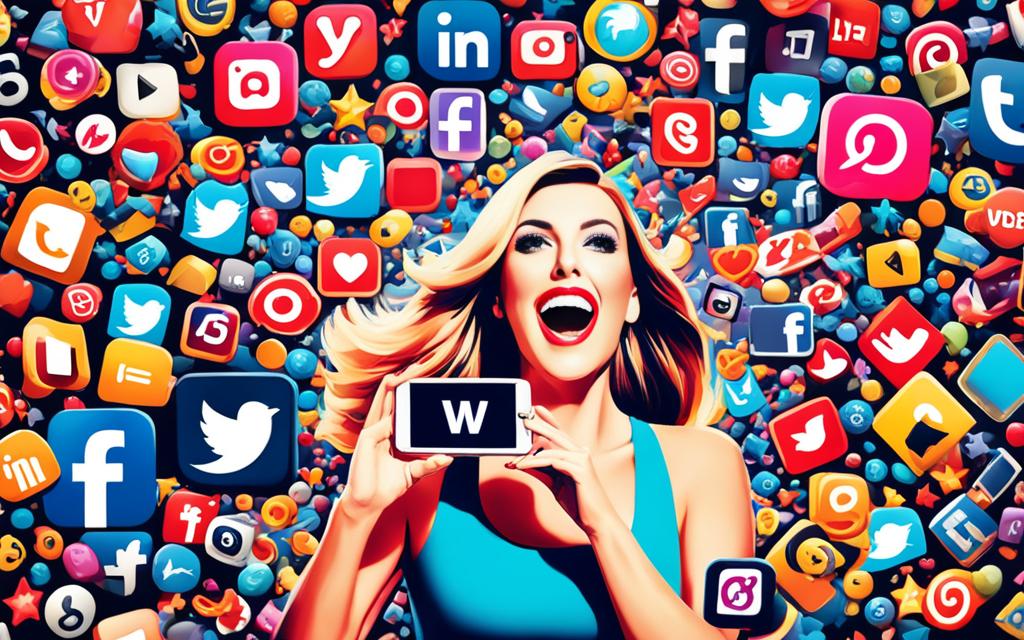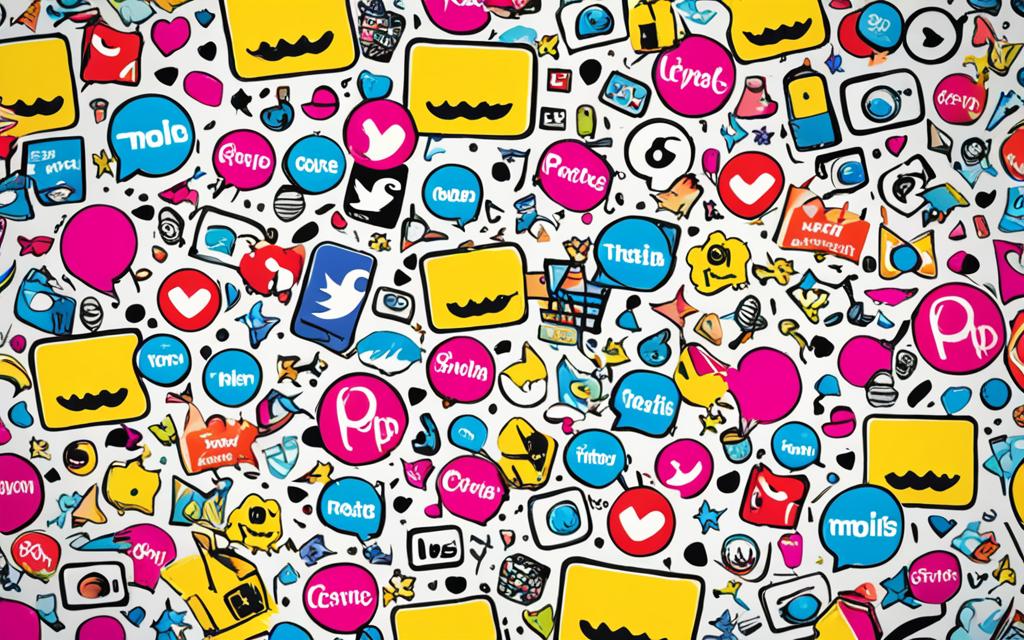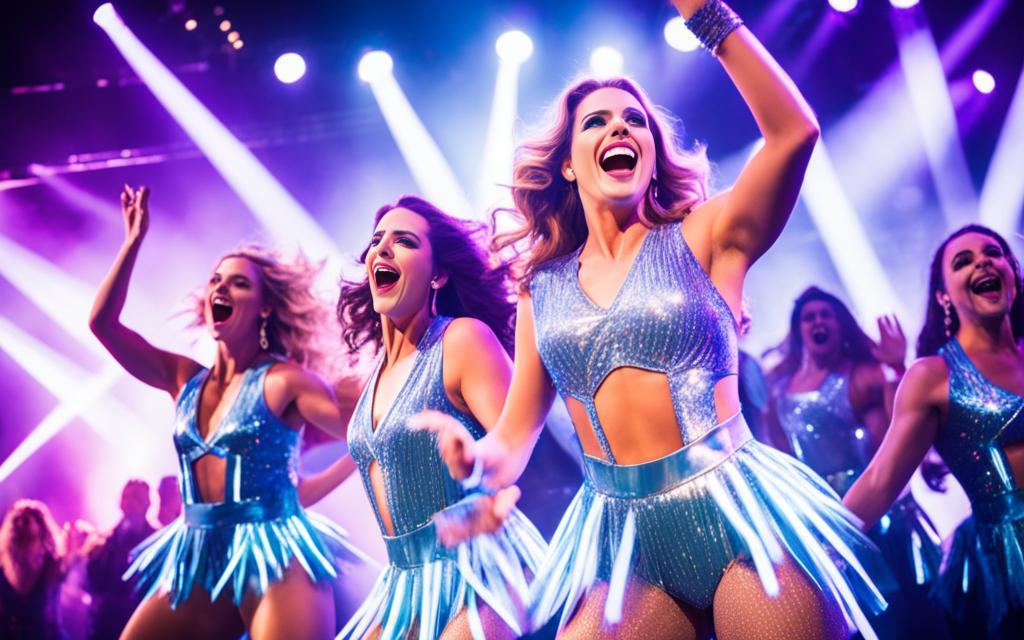Welcome to a journey through the defining moments of the 20th century in pop culture. From unforgettable music performances and historical sports achievements to viral internet sensations and cultural shifts, we will explore the captivating moments that have shaped our entertainment landscape.
Pop culture has always had the power to capture our imagination and leave a lasting impact. These moments not only entertain us but also reflect the values, trends, and aspirations of society. They serve as a window into our history and remind us of the power of human creativity and expression.
Throughout this series, we will delve into the mesmerizing world of pop culture and discover the key figures who have played a significant role in creating these iconic moments. From legendary musicians like Elvis Presley and Madonna to iconic athletes like Muhammad Ali and Serena Williams, these individuals have left an indelible mark on our collective memory.
So get ready to relive the most memorable moments in pop culture history and celebrate the talents and visionaries who have made them possible. Let’s dive into the past and celebrate the cultural phenomena that have shaped the present.
Stay tuned for the next section where we will explore memorable music performances that have left a lasting impact on pop culture.
Memorable Music Performances
When it comes to pop culture, it’s impossible to overlook the impact of influential movie scenes and groundbreaking TV shows. However, music performances have also played a significant role in shaping pop culture history. From iconic live concerts to unforgettable award show moments, these performances have left a lasting impression on audiences worldwide.
One such example is Michael Jackson’s electrifying performance of “Billie Jean” during the Motown 25: Yesterday, Today, Forever special in 1983. His iconic moonwalk and energetic dance moves captivated viewers and set a new standard for live performances. This moment not only solidified Jackson’s status as the King of Pop but also influenced future generations of artists.
Another memorable music performance that became a cultural phenomenon is Beyoncé’s 2016 Super Bowl halftime show. Her powerful rendition of “Formation” showcased her artistry, activism, and unapologetic expression of Black culture. The performance sparked conversations about social issues and solidified Beyoncé’s status as a global superstar.
“Music performances have the power to transcend boundaries and connect people on a deeper level. They become moments of cultural significance, leaving a lasting impact on both the artist and the audience.”
Moreover, influential movie scenes and groundbreaking TV shows have also shaped pop culture through their memorable music performances. One notable example is the iconic dance scene in “Pulp Fiction” featuring John Travolta and Uma Thurman. The synchronized moves to Chuck Berry’s “You Never Can Tell” became a pop cultural phenomenon and are still referenced and imitated today.
In the television realm, the “Friends” episode titled “The One with the Routine” showcased a memorable dance performance by Ross and Monica Geller. Their synchronized dance routine to “Celebration” by Kool & the Gang has become an enduring moment in TV history and a go-to dance move at parties.
| Performance | Artist | Year |
|---|---|---|
| “Billie Jean” at Motown 25 | Michael Jackson | 1983 |
| Super Bowl halftime show | Beyoncé | 2016 |
| “Pulp Fiction” dance scene | John Travolta, Uma Thurman | 1994 |
| “The One with the Routine” on “Friends” | Ross, Monica Geller | 2001 |
Historical Sports Achievements
Sports have always played a significant role in shaping pop culture. From record-breaking performances to championship victories, historical sports achievements have become cultural milestones, captivating audiences around the world. These extraordinary moments not only showcase exceptional athleticism but also contribute to the collective consciousness, triggering cultural shifts and sparking conversations.
One of the most notable historical sports achievements is the record-smashing performance by Michael Phelps during the 2008 Beijing Olympics. Phelps, a legendary swimmer, solidified his place in sporting history by winning an unprecedented eight gold medals in a single Olympics. This remarkable feat captivated the world and inspired generations of aspiring swimmers.
Phelps’ dominance in the pool not only highlighted his exceptional talent but also challenged the notion of what was possible in competitive swimming. His achievements reverberated beyond the sports arena, inspiring individuals to push their limits and strive for greatness in their own pursuits.
Another cultural moment stemming from sports was the “Miracle on Ice” victory by the United States ice hockey team at the 1980 Winter Olympics. Defying all odds, the young and inexperienced American team defeated the heavily favored Soviet Union squad. This triumph not only secured the gold medal for the United States but also symbolized the resilience and determination of the nation during the tense Cold War era.
In addition to celebratory achievements, controversial moments in sports have also triggered cultural shifts. One example is the “Black Power” salute by Tommie Smith and John Carlos during the 1968 Summer Olympics in Mexico City. Their powerful gesture, raising clenched fists in solidarity with the civil rights movement, became an enduring symbol of activism and sparked conversations about racial inequality and social justice.
Throughout history, sports have provided a platform for athletes to make their mark on pop culture, igniting conversations and shaping societal attitudes. These historical sports achievements continue to resonate with people around the world, reminding us of the power of athleticism, determination, and the cultural impact of sports.
Key Takeaways:
- Historical sports achievements have become cultural milestones, shaping pop culture.
- Record-breaking performances and championship victories inspire individuals to push their limits.
- Controversial moments in sports spark conversations about social justice and inequality.
- Sports provide a powerful platform for athletes to make their mark on pop culture and society.
Viral Internet Sensations
As pop culture continues to evolve, the influence of the internet on our society is undeniable. From viral videos to trending challenges, the online world has given rise to a plethora of internet sensations that have become ingrained in our collective consciousness. These viral phenomena have left an indelible mark on pop culture, shaping the way we consume and engage with entertainment.
One memorable example of a viral internet sensation is the “Harlem Shake” meme that took the internet by storm in 2013. It started with a video featuring a single person dancing to Baauer’s song “Harlem Shake,” followed by a sudden chaotic scene with a group of people joining in wild and ridiculous dance moves. This trend quickly spread like wildfire, with people from all walks of life creating their own versions of the dance and posting them online. The “Harlem Shake” meme encapsulated the spontaneity and creativity that the internet fosters, showcasing the power of user-generated content to go viral and capture the attention of millions.
Another internet sensation that had a lasting impact on pop culture is the “Ice Bucket Challenge.” This social media campaign, which aimed to raise awareness and funds for amyotrophic lateral sclerosis (ALS), involved individuals pouring buckets of ice water over their heads and challenging others to do the same. Celebrities, athletes, and people from around the world eagerly participated, sharing their videos on various platforms. The “Ice Bucket Challenge” not only created a sense of unity and purpose, but it also showcased the power of social media in mobilizing support for charitable causes.
Internet sensations like these have not only entertained us but have also influenced subsequent pop culture trends and behaviors. They have compelled marketers, content creators, and even traditional media to adapt and integrate these viral phenomena into their strategies. Brands now actively seek to create content that has the potential to go viral, recognizing the immense reach and impact it can have on their audience.
These viral internet sensations epitomize the power of the internet to seamlessly merge with pop culture, transforming the way we consume, create, and interact with entertainment.
Whether it’s a catchy dance, a funny meme, or an inspiring challenge, viral internet sensations have become an integral part of our pop culture landscape. They not only entertain and bring people together but also reflect the ever-changing nature of our society. As technology advances, it’s safe to say that we can expect even more internet sensations to emerge, further solidifying pop culture’s lasting legacy in the digital age.
Cultural Shifts Triggered by Pop Culture
Pop culture has always had a profound impact on society, shaping our beliefs, values, and behaviors. Throughout the 20th century, influential movie scenes have played a significant role in triggering transformative cultural shifts. These defining moments have challenged the status quo, sparked important conversations, and paved the way for societal progress.
One example of a defining moment in the 20th century is the iconic “I’m mad as hell…” scene from the 1976 film “Network.” This powerful monologue, delivered by actor Peter Finch, resonated deeply with audiences, highlighting the growing disillusionment and outrage towards the media and the larger system. It sparked discussions about the influence of television and the need for individuals to reclaim their power.
Another significant cultural shift occurred with the release of “Gone with the Wind” in 1939. This influential movie scene, featuring Scarlett O’Hara defiantly declaring, “I’ll never be hungry again!”, represented the resilience and determination of the American spirit during the Great Depression. It inspired millions of people and became a symbol of hope and perseverance in challenging times.
Pop culture has also played a crucial role in promoting diversity, equality, and social justice. The groundbreaking film “Guess Who’s Coming to Dinner” (1967) challenged racial prejudices by depicting an interracial couple who faced societal opposition. This influential movie scene exposed the deep-rooted biases and sparked important conversations about racial equality and acceptance.
Furthermore, the music industry has been instrumental in driving cultural shifts. The performance of Bob Dylan at the 1965 Newport Folk Festival, when he famously played an electric guitar for the first time, signaled a departure from traditional folk music and symbolized the changing times. It sparked a revolution in the music industry and paved the way for new genres and artistic expressions.
Iconic movie scenes and memorable music performances have the power to transcend entertainment and shape our culture. They challenge conventions, provoke thoughts, and invite us to re-evaluate our beliefs.
These influential moments in pop culture have not only entertained audiences but also acted as catalysts for change. They have forced us to question the norms, initiate important conversations, and redefine our understanding of societal issues. By embracing these defining moments, we have witnessed significant cultural shifts that continue to impact the 21st century and beyond.
| Influential Movie Scenes | Year |
|---|---|
| Network – “I’m mad as hell…” | 1976 |
| Gone with the Wind – “I’ll never be hungry again!” | 1939 |
| Guess Who’s Coming to Dinner – Interracial couple scene | 1967 |
| Bob Dylan at Newport Folk Festival – Electric guitar performance | 1965 |
Key Figures in Pop Culture
Throughout history, there have been numerous key figures who have made significant contributions to pop culture, shaping it into what we know and love today. From unforgettable music performances to groundbreaking TV shows, these individuals have left an indelible mark on the industry.
Iconic Musicians
Some of the most memorable music performances in pop culture history have been delivered by legendary musicians. Whether it’s Freddie Mercury’s electrifying presence on stage, Michael Jackson’s mesmerizing dance moves, or Beyoncé’s captivating live shows, these artists have redefined the boundaries of live music performances.
Influential Actors and Directors
Groundbreaking TV shows owe much of their success to visionary actors and directors. Figures like Steven Spielberg, who brought us classics like “Jaws,” “Jurassic Park,” and “E.T. the Extra-Terrestrial,” have left an indelible mark on the film industry. Likewise, actors such as Meryl Streep, Tom Hanks, and Viola Davis have captivated audiences with their exceptional talent and performances.
“Acting is not about being someone different. It’s finding the similarity in what is apparently different, then finding myself in there.” – Meryl Streep
Creative Visionaries
Pop culture wouldn’t be the same without the contributions of creative visionaries who have introduced groundbreaking concepts and storytelling techniques. J.K. Rowling, the mastermind behind the Harry Potter series, has enchanted millions of readers and redefined the fantasy genre. Additionally, figures like George Lucas, creator of Star Wars, and David Lynch, the master of surreal storytelling, have pushed the boundaries of imagination and captivated audiences worldwide.
Influential TV Personalities
The influence of pop culture extends beyond music and film. It is also evident in the world of television, where charismatic personalities have become household names. From Oprah Winfrey, who has used her platform for inspiring conversations and social change, to Ellen DeGeneres, whose talk show has brought laughter and joy to millions, these figures have left an undeniable impact on popular culture.
Legacy and Enduring Impact
These key figures in pop culture have not only shaped their respective industries but have also left a lasting legacy for future generations to admire and follow. Their works continue to inspire, entertain, and provoke thought, ensuring that their influence will be felt for years to come.
As we celebrate and appreciate the contributions of these remarkable individuals, it is important to recognize their significant role in shaping popular culture and the impact they have had on our lives.
Conclusion
In conclusion, the iconic moments in pop culture have left a lasting legacy that continues to shape our society. These moments, whether they are memorable music performances, historical sports achievements, viral internet sensations, or cultural shifts, have had a profound impact on our entertainment choices, societal norms, and overall cultural landscape.
From Michael Jackson’s moonwalk to Serena Williams’ Grand Slam victories, these moments have become embedded in our collective memory, symbolizing excellence, creativity, and resilience. They have captured the imagination of millions, inspiring generations of artists, athletes, and influencers.
Pop culture’s lasting legacy can be seen in the way we consume media, the trends we follow, and the conversations we have. It has the power to unite and divide, to challenge and enlighten. Iconic moments have become touchstones in our cultural history, reminding us of the power of human expression and the transformative nature of art.
As we continue to experience new moments that capture our attention and shape our pop culture landscape, it is important to recognize and celebrate the iconic moments that have come before. They serve as a reminder of the rich tapestry of creativity and inspiration that has contributed to our collective cultural identity.








